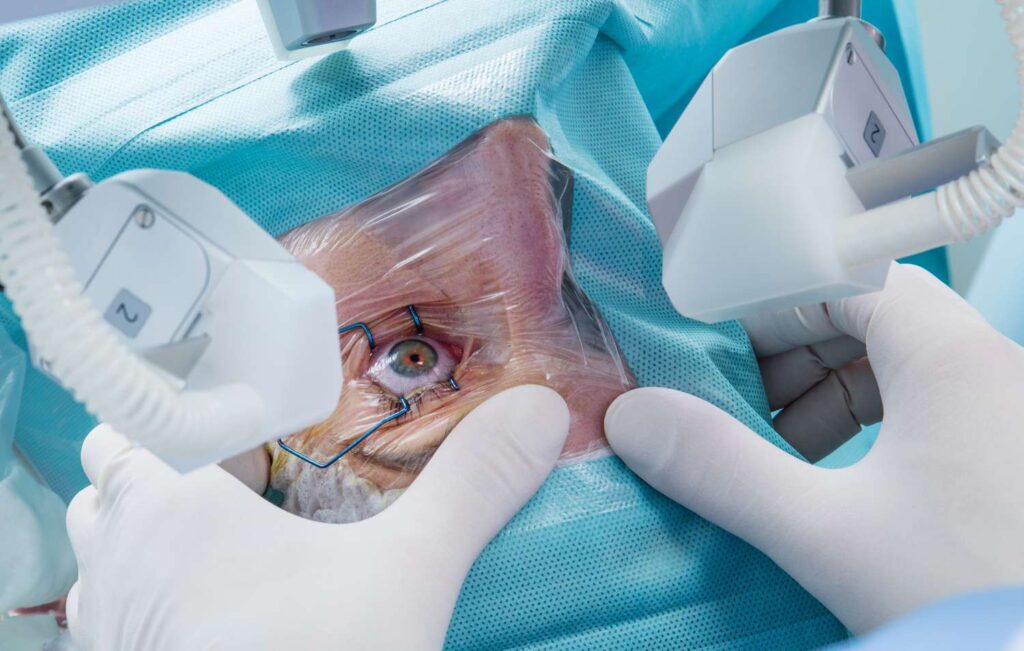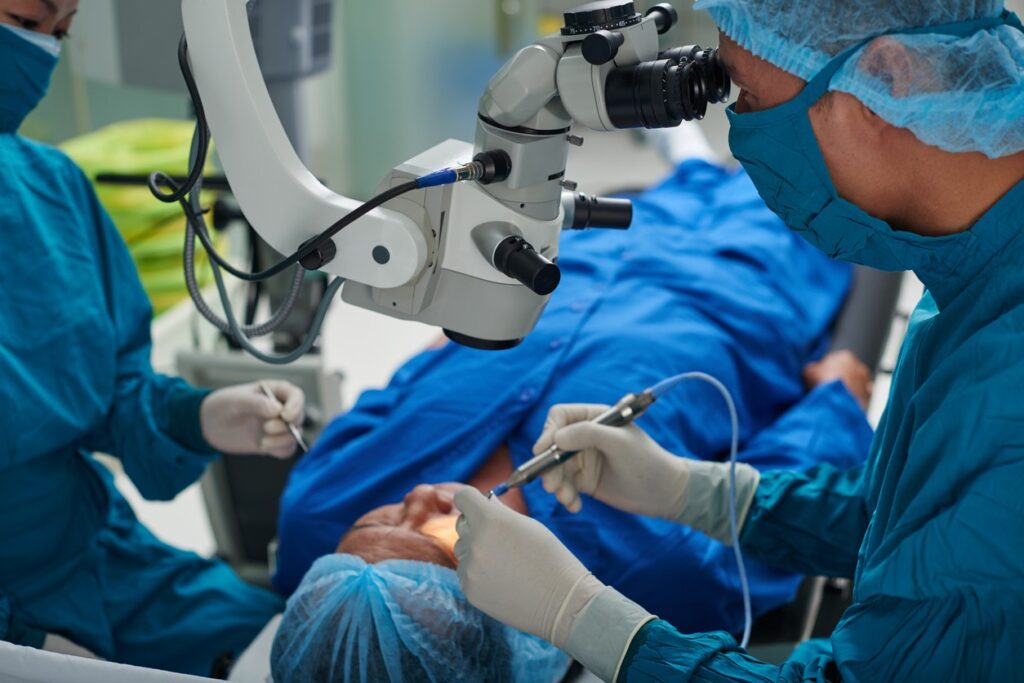Cataract Surgery: Restoring Clear Vision with Expert Care

Understanding cataracts and their impact on vision
Cataracts are a common condition where the lens of the eye becomes cloudy, leading to a gradual decline in vision. This clouding can make everyday activities like reading, driving, or even recognising faces increasingly difficult. In fact, cataracts are one of the leading causes of visual impairment across the globe, affecting millions of people each year.
As we age, the proteins in the lens can clump together, causing this opacity. While anyone can develop cataracts, they are more prevalent in older adults, often becoming noticeable around the age of 60. It’s important to understand that cataracts develop slowly, and their progression can vary greatly from person to person.
What are cataracts?
Cataracts form when the natural lens of the eye, which is normally clear, becomes cloudy. The lens works like a camera lens, focusing light onto the retina at the back of the eye. When it becomes opaque, it scatters light rather than allowing it to pass through clearly, which leads to blurred vision. In some cases, cataracts can lead to complete blindness if left untreated. Cataract surgery is one of the most common and successful surgical procedures performed worldwide. The primary goal of the surgery is to remove the cloudy lens and replace it with a clear artificial lens, restoring clear vision.
There are different types of cataracts, including age-related cataracts, congenital cataracts (which are present at birth), and secondary cataracts, which can develop after certain medical conditions or surgeries. Understanding the type of cataract you have is crucial for determining the best course of action.
How do cataracts affect your vision?
The symptoms of cataracts can vary. Early on, you might notice a slight blurriness or a decrease in contrast sensitivity. As the cataract progresses, people often report colours appearing faded or yellowed, and they might find it increasingly difficult to adapt to changes in lighting. Glare from headlights at night can also become problematic, making driving more challenging.
In time, these visual changes can significantly affect your quality of life. Simple tasks may require more effort, leading to frustration and a decline in daily activities. However, the good news is that cataracts can be effectively treated through surgical intervention.

The importance of early detection and treatment
Early detection and timely treatment of cataracts can prevent worsening vision and potential complications. Regular eye exams become essential as you age, as they can help identify cataracts before they significantly impair your ability to see.
Many individuals may not be aware that they have cataracts until their vision has deteriorated considerably. Thus, awareness and education regarding the early signs and symptoms of cataracts are vital for proactive management.
Recognising the early signs of cataracts
Some of the early signs that may indicate the onset of cataracts include blurred or cloudy vision, increased difficulty seeing at night, and the sensation of ‘halos’ around lights. If you find that your prescription glasses or contact lenses seem to require frequent adjustments without significant improvements in your vision, it could be a sign that cataracts are developing.
Addressing these symptoms early with your healthcare provider can lead to more effective management options and better outcomes. Read more about symptoms at https://www.cancer.gov/publications/dictionaries/cancer-terms/def/symptom
The role of regular eye examinations
Regular eye examinations play a crucial role in detecting cataracts early. During these visits, your eye care professional will conduct specific tests to assess your vision and examine the health of your eyes. If cataracts are detected, discussion regarding treatment options can begin.
It is recommended that adults aged 60 and older have comprehensive eye exams every one to two years, or more frequently if recommended by an eye care professional.
An overview of cataract surgery
The procedure itself is typically performed on an outpatient basis, meaning you can return home the same day. Generally, it’s performed under local anaesthesia, which ensures that you remain comfortable throughout the operation.
What to expect during cataract surgery
During the surgery, your surgeon will create a small incision in the eye, using either ultrasound or a laser to break up the cloudy lens. The pieces are then gently vacuumed out, and the artificial lens implant is inserted. The procedure usually takes about 15 to 30 minutes, though the entire process, including preparation and recovery, may take longer.
Post-surgery, you may experience blurriness initially, but this is temporary as your eyes adjust to the new lens. Most patients notice improved vision within a few days.
Different types of cataract surgery
While the most common form of cataract surgery is phacoemulsification, there are other methods that might be used depending on the specific circumstances. For instance, extracapsular cataract extraction involves removing the cloudy lens in one piece when it is too dense to be broken up with ultrasound. Click here to find more about phacoemulsification.
Your ophthalmologist will recommend the most suitable option based on the severity of your cataracts and overall eye health.
The role of expert care in successful cataract surgery
The choice of a skilled surgeon and surgical facility is paramount to achieving a successful outcome in cataract surgery. Researching your options and understanding the credentials and experience of your surgeon can make a significant difference in your overall experience and results.
Moreover, the type of technology and techniques employed in the surgical procedure can greatly affect recovery times and visual outcomes. Expert care also entails thorough pre-operative assessments and post-operative follow-ups, ensuring that every aspect of your surgery is managed with precision.
The importance of choosing a skilled surgeon
Your surgeon’s experience and expertise can significantly influence the success of your cataract surgery. An ophthalmologist with a wealth of knowledge in refractive and cataract surgery will likely have performed numerous procedures, which can translate to fewer complications and better results.
Consider asking potential surgeons about their experience, success rates, and any specific technologies they utilise. It’s essential to feel comfortable and confident in your choice of surgeon.

How expert care can enhance recovery
Post-surgery, having access to skilled healthcare professionals for monitoring and support significantly enhances your recovery. They can provide guidance on eye care, medications, and any necessary lifestyle adjustments to aid in your healing process.
Moreover, they will be able to promptly address any concerns or complications, ensuring that your visual recovery is as swift and effective as possible. Following their advice is essential to securing the best potential outcome.
Life after cataract surgery
Many patients experience remarkable improvements in their vision following cataract surgery. With the cloudy lens removed and replaced with a clear artificial lens, activities that were once challenging can become a pleasure again.
However, it’s vital to adjust to these changes. While initial improvements in eyesight are often celebrated, some individuals may need to adapt to new visual experiences, especially if they have worn glasses or contact lenses for many years.
Adjusting to improved vision
It is not uncommon for patients to feel disoriented immediately after cataract surgery, simply because of the sudden clarity of vision. As your eyes adjust, you may notice that colours appear more vibrant and clearer than ever before. This rewarding change can take time to fully appreciate as your brain adapts to the improved light levels.
Support from family and friends can be invaluable during this adjustment period. They can assist you in your activities and provide encouragement as you navigate these new visions.
Maintaining eye health post-surgery
Continuing to care for your eyes after cataract surgery is essential for maintaining good vision. Attend all follow-up appointments and adhere to any prescribed medication regimens to promote healing.
Additionally, adopting a healthy lifestyle that includes a nutritious diet, protection against UV light, and quitting smoking can greatly contribute to your overall eye health. Regular eye examinations remain crucial, as they can help detect any potential new issues before they become significant problems.
Other resources: Everything You Need to Know About Cataracts Surgery
